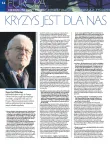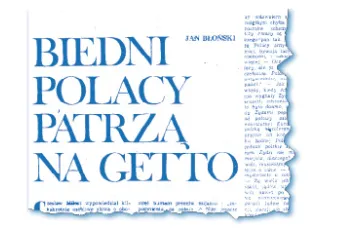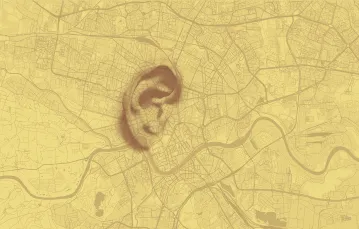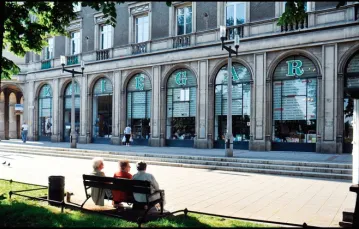Wykupienie dostępu pozwoli Ci czytać artykuły wysokiej jakości i wspierać niezależne dziennikarstwo w wymagających dla wydawców czasach. Rośnij z nami! Pełna oferta →
Is the history of Europe still the history of individuals?
History becomes comprehensible only when we regard it in terms of the fate of specific individuals. I’ve always found the histories of individual people to be the most interesting. In my books I attempt to illustrate history by using, among other things, my own family as an example. My father was a high-ranking Gestapo functionary during the war. Studying his life, I slowly discovered why my parents and grandparents became the people they eventually became.
For some time now I’ve been living in a village in Austrian Burgenland. In the local cemetery I once found the grave of two Poles-both named Stanislaus-who had been murdered just after the war by the Russians. I was the first to notice that this was the grave of someone who shouldn’t be buried there; the Stanislauses weren’t from there. How did they get there? How did it happen that they were killed by the Russians after the war?
No matter where we go, we-Austrians, Germans, Poles- find traces of a tragic history everywhere. This history still determines to a great extent the fate of individuals-despite the fact that more peaceful times have come to Central Europe. Fate no longer treats us as tragically as it treated previous generations. I was born in 1944, but I don’t really know what the war is. My son is 33, and I think he imagines that the world was always the way it is now. In recent times Europe has changed for the better. But the history of the first half of the 20th century created us all, and we continue to live in its shadow, in the shadow of that age of those totalitarian systems. For me as an individual and as a writer there is no longer any escape from history. I’ve been caught in its trap through no fault of my own.
How much longer will the history of the 20th century hold us in its grasp?
Until we’ve told the story of the last individual buried in an unknown tomb. The telling of history should extend all the way to the last protagonist.
Not long ago in Graz I gave a series of lectures on creative writing. I told the story of the Stanislauses. After the final lecture one of the students approached me and told me about an incident that took place in his village: how a forced laborer stole a loaf of bread from a farmer, who shot him after a brief chase. That farmer went on to serve as mayor of the parish for years. And to this day no one speaks of the incident. But this individual episode lives on in people’s minds and gives them no peace. I don’t know what to do now; go there, write the story? Where should it begin, where should it end?
Totalitarian governments and world wars mark out an axis of “negative memory." But there is also a “positive memory" of those times: stories about a good Caesar, about trains that ran on time… Can these be explained as something other than nostalgia?
I think our cultural identity was created in exactly these times. Take Galicia for example. Today, Galicia is a myth: it lives on in literature and in the minds of individuals-usually as recollections of how numerous cultures, languages and nationalities were able to coexist under a single government. Yet, it wasn’t all roses in Galicia, despite how we think of it today. In the 80s I wrote a book about this region, and everyone was shouting: “Pollack is demasking, destroying the myth of Galicia." But I’m fully aware how much we need myths like these. People simply want to remember Galicia, Central Europe.
I don’t know what the future of the Galician myth will be. Galicia, Austria-Hungary itself was an experiment closely resembling today’s unified Europe. Looking at our continent today I wonder how it will function in the future. And I have, unfortunately, plenty of doubts and anxieties. The European Union is now primarily an administrative creation. We talk too little about European ideas. But most of all we lack outstanding politicians, people who have ideas and who speak of them openly. Prime Minister Tusk’s July speech in the European Parliament made quite an impression in Austria. Of course, Tusk won’t be a second Caesar, but his appearance was something new; it didn’t go unnoticed. There is a shortage of great statesmen in Europe.
ii
In your books, the idea is repeatedly advanced that the old fears that plagued Central Europeans have not disappeared, that they-especially in the provinces-are continually reviving.
I write primarily about the fear of the Other. Not long ago, Denmark closed its borders. Austrians are also world-champion worriers: they live in constant fear of the mythical East. We have prosperity, we live in safety, but if you talk to people on the street, they tell you they’re afraid. Look through the window, at our café garden, at that woman- she’s probably a Romanian. No one’s afraid of her, of course. But no one wants to welcome her into this world, accept her presence at Café Sperl, her presence in Vienna. I remember how, when the borders opened, the Austrians were afraid the people from the East would take their jobs. I don’t know if that fear is inherent to man; it’s enough that it occurs only in this Europe of ours. Only in our case it happens that we feel threatened whenever someone new appears. In the United States this would be unthinkable.
Even today, when we talk about Ukrainians for example, we do it in such a way that a wall is erected, and in the end the most frequent conclusion is that it would be best if the Ukrainians stayed where they are right now. This is the most important function of a border: to exclude, to ensure that someone doesn’t come to us. And this is ridiculous: in Vienna, every other person is either from the East or from Turkey.
In Europe we still use the category of exclusion in our discussions…
And this is precisely what I wanted to draw attention to. We don’t look at what connects us, only at who can be excluded. We are almost certain to exclude Turkey. From an economic standpoint this is a doubtful move, because it’s a big market; yet nearly all Europeans share that opinion. We constantly return to discussing whether in Europe, in public places, women should be allowed to wear burqas. And I have a photograph taken by my father in Sarajevo in 1941: the women eternalized in the picture are wearing burqas. This happened in the very heart of Europe!
But for the Europeans of that time, it was still the Orient.
An Orient that was a natural part of Europe. Burqas and minarets were a part of the European landscape.
Postwar generations accept a world without diversity at face value.
This is a problem that has arisen all over Europe: from Denmark to Holland, from Poland to Russia. I’m unable to define it. But the existence of this problem pains me, because I live in a world that I think should be open. We can’t exclude Ukrainians or Belorussians from the European community. If this were to happen, we would have only ourselves to blame. Today we, not Stalin, draw the borders. Those who once complained about the “iron curtain" are now helping build a new one.
In the 90s we were dealing with a wave of nationalism
in East-Central Europe that has been halted to a large extent,
and that only in Yugoslavia has led to an exceptionally
tragic conclusion. Today, in the light of the popularity
of extreme judgments and opinions, do you see a second
wave of nationalism? Certain debates are carried out with
such ferocity that it is as if they were arguing about redrawing
the borders! Meanwhile neighbors argue now and then
about how surnames should be spelled.
The Polish-Lithuanian dispute will no doubt settle down with time, but in other parts of the region we already have a serious problem, for example, nationalism directed against Romanians in Hungary, the Czech Republic or Bulgaria. It’s easier for us people from the West to lecture others, saying: “Listen, we’re Europeans. You shouldn’t treat minorities this way!" But it’s the residents of these countries-and not the affluent West-that are faced with this problem. Unfortunately, economic problems play a large role here. Even in Austria-a country that could be called wealthy, stable, even dull-the crisis could lead to the reemergence of extremist politics, despite the fact that in Kosovo the unemployment is at 40 percent, and in Austria only 4 percent.
While reading “After Galicia," many educated Poles were surprised to learn that in the cities you described one third, and sometimes one half of the residents were Jewish.
This is interesting, because in Austria it’s the other way around: we all think that Galicia was primarily Jewish. Here as well nostalgia plays a major role; we feel that Galacia was fantastic, if not a little artificial. But that Ukrainians lived there? Few people remember this.
Isn’t it a bit as if we woke up after WWII in a seriously “damaged" Europe? The Jewish community created the dominant climate in many Galician cities. The cities remain, but their identity has been lost.
Those events led us to provincialization-in the negative sense of the word. Europe became more provincial. We’re still struggling with this problem even today. In smaller towns and villages, there is no intelligentsia, no thinking, active group of people. In Galicia, the people suddenly found themselves alone. Objects remained-their owners disappeared. There’s a bitter sense behind this. Because all of us are aware it shouldn’t be like this.
After such an event there are always attempts to recall the old world-unfortunately, often in a kitschy rendition. Krakow’s Kazimierz district is an example of this: it’s a tourist center for Jewish kitsch. Many people who visit the place think a lot like most Austrians: that Galician villages were once full of klezmer bands…
How do you perceive the capital/province axis in present-day Central Europe?
I think the provinces are more important today than 50-60 years ago. The residents of today’s provinces are less sated, less worn out, less discouraged. Large cities are no longer the future of Europe; the future is in the provinces. I myself live today in a town I wasn’t born in. I don’t pretend to be a Burgenlander, I don’t pose as a farmer. I feel good as a guest. Living in distant provinces doesn’t make one a worse European.
You once gave a highly suggestive description of Ruse- a small town in Bulgaria on the Danube near the Romanian border. You spotted an old walking stick made of black wood belonging to one of the residents-sticks of this sort were carved only in Galicia-and you thought about the long road
it must have traveled. These kinds of objects with “souls" are
slowly disappearing from our world.
I’ve noticed this myself. Objects play an enormous role in my life. I’m a man who has to touch something-maybe because I studied carpentry as a young boy. To imagine a story, I need images or objects. I walk with my head close to the ground and I always find something. I pick up almost everything off the street-it’s a habit of mine. That walking stick in Ruse told its own story. Today we throw objects away. But before the war no one would have even considered throwing out a walking stick. It served its purpose until it broke. And this is how Europe functioned until recently. It was easy to see where a given thing came from and how it was made. Someone worked on it. Someone left their traces on it.
Today objects are made to wear out quickly.
And back then their origin was what mattered. I was once in Daugavpils in Latvia. Today it’s a half-deserted city. In the Soviet era it was the country’s specialist producer of bicycle chains. And how many bicycle chains does Latvia need today?
Photography, which has played an important role in your
books, has nearly vanished from the world: now we collect our
photographs in computer memory, which only lasts a few years.
Aren’t we losing important footholds this way?
It certainly seems so to me. Take a look at the picture of
a teacher from the cover of the Polish edition of the book “How They Shot the Stanislauses." We don’t know her name. Standing next to her is one of the forced laborers from Poland I was talking about. I was really happy that someone brought me that photograph, because thanks to it I know now what my protagonists looked like. I imagine they did
well at forced labor because they look tidy, well fed and well treated by their farmers. In another photograph, one of the Poles even has a suit borrowed from “Uncle Hans" who was sent to the front.
And that brings us to the second picture of importance to me. It shows my father throwing snowballs at his friends. Nazis dressed like this on liberty… Everything in this picture fits. We can estimate with a high degree of certainty when this picture was taken. A lot can be read from such a photograph.
These mountains… in Austria they always used to say that the Third Reich begins at one thousand meters. The alpinist community was saturated with nazism. That’s still often the case even today. Just visit a few mountain huts. A year ago I was at a literary meeting in a Jewish hut described in The Patricides, the Friesenberg Haus, 2500 meters above sea level. The owner of this hut showed me a visitor’s book in which it wasn’t hard to find an entry reading: “We don’t want Jews in our mountains!"
How in this case should we describe the world of the young-
a world without objects?
I don’t know-I won’t even try to describe that reality.
There’s a kind of twist of fate in this; in a world that’s deemed
materialistic to the core, that’s deemed to have less and less
spirituality in it, there’s actually no material at all. Or more
precisely: it’s replaceable, transient. We spend money on
the same things our neighbor has.
It’s the same way with writing. Imagine that I still write with a pencil. Once I met up with friend, also a writer, who nevertheless writes with a fountain pen, even though he’s a few years younger than me. And this is something completely different…
In Ruse you observed the “maturing for Europe" process,
a process that manifests itself in the organization of space
in the Western fashion: balconies and verandas were
incorporated into the landscape as if by force. You write
about this as if it were a destructive process, almost barbarism.
But this is a barbarism that’s inevitable. Is this perhaps a kind
of natural erosion as in the natural environment?
There are two issues here. On one hand, it would be very dangerous if they were to renovate all of the balconies in Ruse to make everything look the way it did a hundred years ago. Then we would be dealing with the kind of kitsch I was discussing in the case of Kazimierz. On the other hand, when everything is crumbling and falling apart it’s no good either. I don’t know how to resolve the problem. For me it’s interesting that there isn’t just one world. That when I travel there, I see a certain kind of architecture, I smell a certain aroma typical of that place. Maybe I’m looking for something I don’t have? Maybe I dream of acquiring something unique to the place?
When I wrote “After Galicia," I couldn’t travel to Galicia; in the 80s I was classified by the Polish People’s Republic as persona non grata. The Soviet Union was totally inaccessible. I traveled to Lvov for the first time in 1992 with Chris Niedenthal. In spite of the extreme poverty it was immediately apparent that this was Central Europe sensu stricto. Only later did I meet Jurij Anrychowicz, and I was surprised: there were people to be found whose minds belonged to Central Europe as well.
The border between Central and non-Central Europe
sometimes runs through a country’s interior. Ukraine is
the best example of this.
In the 80s I took part in a discussion on the following topic: where is Central Europe? Does it exist at all? Even back then I felt that our main objective was to exclude someone from that Central Europe. Austrians have always known that Central Europe is Vienna. But also: Budapest, Prague, Krakow, Zagreb. Yet, we’ve also always been convinced that the Germans don’t belong to Central Europe! So I don’t know if there’s a point in saying whether this or that country belongs to Central Europe or not.
Do Central Europeans care about each other? Does a real community exist in this region?
I was surprised to meet people in Lvov at that time who were deeply rooted in that region’s distant past-for example, Jurko Prochazka. I have a friend, an American, who knows the history of that region backwards and forwards- Timothy Snyder. But he observes it from a distance, and for us it’s a part of our history, the history of our family. In Vienna I once met Billy Wilder, who was born in the Beskid Mountains. He spoke about himself and he told me: “I’m from Galicia." He didn’t remember much from that period, but he felt that he was a Galician.
And this brings us back to the provinces. Common interests are to be found in the provinces. I buy large quantities of old postcards and photographs on the Internet. The rule is always the same: if they come from Drohobych, the price jumps to 70 euros. Why is everyone buying postcards from Drohobych? Is it just because Bruno Schulz lived there? And Kołomyja, and Stryj? Who will remember them? These places are brimming with undiscovered history.
As a translator of Polish literature into German, you’re an exceptional mediator of ideas. What can East-Central Europe
give the West? In your work are you pursuing some sort of program aimed at opening the eyes of people from the West?
Polish literature is known and recognized throughout the world, especially in the German-speaking region. But literature isn’t everything. In the long run, we know much less about the East than the East knows about us. Who among us in Vienna knows a Slavic language? And my friend and fellow writer from Ukraine speaks fluent German. It’s the same with literature; educated Poles know Musil, Joseph Roth, and in Austria-who knows Belorussian or Ukrainian literature?
Poland has always been something of a conveyor belt between the West and Ukraine. It was through Polish translations that we got to know Andruchowicz, for example. There was no other possibility. I myself have translated texts by Andruchowicz from Polish, because there was no way to translate from Ukrainian…
Do the borders of Europe have permanent character?
I studied and worked in Yugoslavia. It’s the best example of a region where suddenly in the 90s completely new borders were drawn, and now everyone seems to think they always ran as they do now. In spite of this, I think the current borders are fairly permanent, although-fortunately-they are becoming more a matter of convention. I say “fortunately," although I have a particular fondness for borders.
During the Balkan wars in the 90s I was a correspondent for “Der Spiegel." I traveled from Vienna to Zagreb, some three hours by car. And I quickly found myself in a completely different world, not to mention Vukovar, where I ran into the front lines of the war. But the most difficult thing for me to accept was the fact that while people there were dying, in Vienna and in other European cities life went on. Peaceful, day-to-day life. Life across the border.
Martin Pollack (1944), austrian writer, journalist and translator of polish literature (kapuscinski, bobkowski, wilk, dichter). he graduated in slavic studies and history of Eastern Europe, studying at universities in Vienna, warsaw and sarajevo. he worked as a commentator for “der spiegel" weekly magazine. in 2007 he received the angelus prize for the book “der tote im bunker. bericht über meinen Vater," where he presented the history of his own family, focusing on the war activities of his father, gerhard bast, who was an SS officer and war criminal. he also received karl dedecius award for the best german translator of polish literature.







